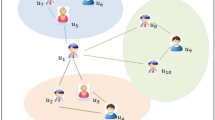Abstract
The Internet has not only brought us more information and choice, but has also increased the burden of making a choice. Recommender systems aim to address this problem by providing personalised recommendations in areas such as music, films or books. Research on recommender systems has focused on improving the matching algorithms. The research presented in this paper takes a user-centred approach. Since recommendations are usually presented as lists of items, without explanations or justifications, users struggle to find out how appropriate recommendations are for them. Our research has shown that the relationship between advice-seeker and recommender is extremely important, so ways of indicating social closeness and taste overlap are required. We thus suggest that drawing on similarity and familiarity between the user and the persons who have rated the items can aid judgement and decision making. This was tested in an experiment, which carefully controlled familiarity, profile similarity and rating-overlap between the user and those rating items. The results help us understand the decision-making processes in an on-line context, and form the basis of a usercentred recommender system approach. We suggest that recommender systems can be improved by combining the benefits of social networking applications — such as explicit networks of trust — with the matching capabilities of recommender systems.
Similar content being viewed by others
References
Schwartz B: ’The Paradox of Choice’, Harper Collins, (2005).
MovieLens — http://movielens.umn.edu/
Herlocker J L, Konstan J L, Borchers A and Riedl J: ’Explaining collaborative filtering recommendations’, in Proceedings of the ACM 2000 Conference on Computer Supported Cooperative Work, pp 241–250 (2000).
Swearingen K and Sinha R: ’Beyond algorithms: An HCI perspective on recommender systems’, in Proc of ACM SIGIR 2001 Workshop on Recommender Systems, New Orleans, Lousiana, pp 24–33 (2001).
Swearingen K and Sinha R: ’Interaction design for recommender systems’, in Proc Interactive Systems (DIS2002), London (June 2002).
Sarwar B M, Karypis G, Konstan J A and Riedl J: ’Item-based collaborative filtering recommendation algorithms’, in Proc of the Tenth International World Wide Web Conference, pp 285–295 (2001).
Breese J S, Heckerman D and Kadie C: ’Empirical Analysis of Predictive Algorithms for Collaborative Filtering’, in Proc of the Fourteenth Annual Conference on Uncertainty in Artificial Intelligence, pp 43–52 (1998).
Canny J F: ’Collaborative Filtering with Privacy via Factor Analysis’, in Proc of SIGIR 2002, Tampere, Finland, pp 238–245 (2002).
Sinha R and Swearingen K: ’Comparing Recommendations made by Online Systems and Friends’, in Proceedings of the DELOS-NSF Workshop on Personalization and Recommender Systems in Digital Libraries (2001).
Riegelsberger J, Sasse M A and McCarthy J D: ’The Mechanics of Trust: A Framework for Research and Design’, in Journal of Human-Computer Studies (in press) (2005).
Massa P and Avesani P: ’Trust-aware Collaborative Filtering for Recommender Systems’, in Proc. of The International Conference on Cooperative Information Systems (CoopIS), Larnaca, Cyprus (October 2004).
O’Donovan J and Smyth B: ’Trust in Recommender Systems’, in Proc of The International Conference on Intelligent User Interfaces, San Diego, California, pp 167–174 (January 2005).
Briggs P, De Angelo A, Burford B and Lynch P: ’Trust in Online Advice’, in Social Science Computer Review, 20, No 3, pp 321–332 (2002).
Bonhard P and Sasse M A: ’’I thought it was terrible and everyone else loved it’ — A New Perspective for Effective Recommender System Design’, Springer Verlag, in Proc of the 19th British HCI Group Annual Conference, Napier University, Edinburgh, UK, pp 251–265 (September 2005).
Eysenck M W: ’Language and Thought’, in: ‘Psychology — A Student’s Handbook’, Hove, Psychology Press Ltd, (2000).
Gross R: ’Problem-solving, Decision-making and Artificial Intelligence’, in: ‘Psychology — The Science of Mind and Behaviour’, London, Hodder & Stoughton (2001).
Harvey N and Fischer I: ’Taking Advice: Accepting Help, Improving Judgement, and Sharing Responsibility’, in Organizational Behavior and Human Decision Processes, 70, No 2, pp 117–133 (1997).
Yaniv I: ’Receiving other peoples’ advice: Influence and Benefit’, Organizational Behavior and Human Decision Processes, 93, No 1, pp 1–13 (2004).
Yaniv I: ’The Benefit of Additional Opinions’, American Psychological Society, 13, No 2, pp 75–78 (2004).
Yaniv I and Kleinberger E: ’Advice Taking in Decision Making: Egocentric Discounting and Reputation Formation’, Organizational Behavior and Human Decision Processes, 83, No 2, pp 260–281 (2000).
Perugini S, Goncalves M A and Fox E A: ’A connection centric survey of recommender system research’, Journal of Intelligent Information Systems, 23, No 1 (2004).
Lueg C: ’Social Filtering and Social Reality’, ERCIM, in Proceedings of the 5th DELOS Workshop on Filtering and Collaborative Filtering, Budapest, Hungary, pp 73–77 (November 1997).
Friendster — http://www.friendster.com/
Facebook — http://www.facebook.com/
hi5 — http://www.hi5.com/
mySpace — http://www.myspace.com/
Donath J and boyd d: ’Public displays of connection’, BT Technology Journal, 22, No 4, pp 71–82 (October 2004).
boyd d and Heer J: ’Profiles as Conversation: Networked Identity Performance on Friendster’, in Proceedings of the Hawaii International Conference on System Sciences (HICSS-39), Kauai, HI: IEEE Computer Society, (January 2006).
Berscheid E and Reis H T: ’Attraction and close relationships’, in Gilbert D T, Fiske S T and Linzey G (Eds): ’The Handbook of Social Psychology’, 2, 4th, 22, Oxford University Press, pp 193–281 (1998).
Strauss A and Corbin J: ’Basics of Qualitative Research — Techniques and Procedures for Developing Grounded Theory’, London, SAGE Publications (1998).
Perugini S, Goncalves M A and Fox E A: ’Recommender Systems Research: A Connection-Centric Survey’, in Journal of Intelligent Information Systems, 23, No 2, pp 107–143 (2004).
Bonhard P, Harries C, McCarthy J D and Sasse M A: ’Accounting for Taste: Using Profile Similarity to Improve Recommender Systems’, In Proceedings of CHI 2006, Montreal, Canada, pp 22–27 (April 2006).
Gigerenzer G: ’Fast and Frugal Heuristics: The Tools of Bounded Rationality’, in Harvey N and Koehler D (Eds): ‘Blackwell Handbook of Judgment and Decision Making’, Oxford, Blackwell, 4, pp 62–88 (2004).
Flick U: ’An Introduction to Qualitative Research’, London, Sage Publications (1998).
About this article
Cite this article
Bonhard, P., Sasse, M.A. ’Knowing me, knowing you’ — Using profiles and social networking to improve recommender systems. BT Technol J 24, 84–98 (2006). https://doi.org/10.1007/s10550-006-0080-3
Issue Date:
DOI: https://doi.org/10.1007/s10550-006-0080-3




